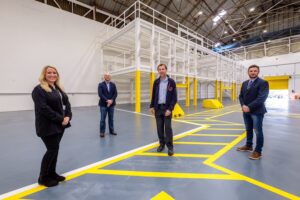Visualising the future of construction training through VR & AR

A New £2 million pan GB project to improve efficiency and employee safety in the construction industry is being led by the Construction Wales Innovation Centre (CWIC).
The project called CONVERT, which is part-funded by the Construction Industry Training Board (CITB), will provide construction training using state of the art immersive technologies – virtual reality (VR) and augmented reality (AR).
VR can be used to simulate real world situations and scenarios, giving workers hands-on experience and training prior to entering a jobsite – helping employers to educate, plan and improve overall productivity and the safety of all staff on site.
In September 2017, CITB published a research report entitled ‘A new reality: immersive learning in construction,’ which highlighted the significant benefits of immersive learning to employers and employees as well as changing the perception of the construction industry to investors and young people.
CONVERT project director, Gareth Evans at CWIC, said:
“The CONVERT project is one of a number of newly commissioned programmes that pilot the use of Immersive Learning in Construction. With co-funding from CITB, the development partners that include Construction Scotland Innovation Centre, Kier UK and Altrad UK, will exploit technologies such as the latest VR, AR and simulators to deliver their training programmes.”
“Virtual reality can place employees in an immersive virtual world where realistic safety critical scenarios can be explored and tested. In this way trainees and staff can be work-ready in shorter lead times and more conversant with health and safety protocols and practice than conventional training approaches.”
CWIC will provide the overall project management for this two-year programme, with four key strands:
- Drones in the construction industry – led by Kier Construction Ltd.
- Wood finishing and paint spraying – led by CWIC
- Working at height – led by Altrad UK
- Building Deconstruction – led by Construction Scotland Innovation Centre (CSIC) using laser-scanning and high quality rendering to produce a virtual deconstruction of a building.
Alongside the creation of the content CWIC is developing the infrastructure for industry and education to access such technologies without considerable financial investment.
Six regional delivery hubs will facilitate the distribution and delivery of the training material in their area. This will enable the project to be scaled up as demand grows.
The hubs are:
- Construction Wales Innovation Centre
- Construction Scotland Innovation Centre
- Leeds College of Building
- Dudley College
- Bridgewater & Taunton College
- London Borough of Waltham Forest
Barry Liles, OBE, Pro Vice-Chancellor (Skills & Lifelong Learning), University of Wales Trinity Saint David said,
“UWTSD is so pleased to be working in collaboration with well-established industrial partners to develop and deliver these new, emerging and innovative learning technologies within a sector key to the economy of the country. This project will have a significant impact upon the development of new entrants and existing employees and lead to productivity improvements for those organisations engaging in their use.”
Mark Bodger, Partnerships Director, CITB Wales said: “The Construction Wales Innovation Centre (CWIC) is transforming training across Wales. Before CWIC opened some students had to leave Wales and travel to England to learn the latest construction skills. Now learners can stay in their homeland and acquire the skills Welsh employers have told us are most needed. Skills like working with technology, offsite manufacturing and comprehensive scaffolding training.
“By collaborating with partners across the education and employment spectrum CWIC will provide career paths that will take young people to the highest levels in construction – good news for young people, good news for our communities and good news for the Welsh economy.”
Content Example



